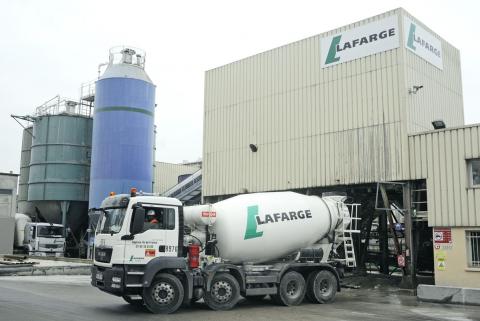The world’s two largest cement makers, France’s Lafarge SA and Switzerland’s Holcim Ltd, on Saturday agreed on the terms of a merger that would create a company with a stock market value of about US$55 billion, French newspaper Le Figaro said online.
Company representatives were not immediately available for comment. The story did not identify sources.
The firms had issued dual statements on Friday saying they were in advanced merger talks, eyeing a deal to help slash costs, trim debt and better cope with the soaring energy prices and weaker demand that have hurt the sector since the 2008 global economic crisis.

Photo: Bloomberg
The deal would see Holcim launch a public takeover offer for Lafarge, payable entirely in shares, Le Figaro said.
If successful, the combined entity would be based in Switzerland, but have operational headquarters in both Switzerland and France.
Lafarge chief executive Bruno Lafont would become CEO of the combined entity, while the chairman will be Swiss, according to the report.
Any deal is likely to draw scrutiny from European regulators, who would probably require the companies to shed cement plants and distribution facilities before approving any merger.
Industry observers said that the rankings of the firms’ sizes vary according to methodology.
According to a ranking last year by specialized trade magazine Global Cement, which assesses overall output capacity based on a broad range of factors, China’s Anhui Conch Cement Co (安徽海螺水泥) had an annual output capacity of 217 million tonnes, followed by Lafarge with 205 million tonnes and Holcim with 174 million tonnes.
Founded in Switzerland in 1912, Holcim employs 71,000 people, with production sites in about 70 countries and a market presence on every continent. It notched up net sales of 19.7 billion Swiss francs (US$22.2 billion) last year.
Lafarge began as a French limestone-quarrying company in 1833 and now employs 65,000 people in 64 countries, with sales of 15.8 billion euros (US$21.65 billion).

CAUTIOUS RECOVERY: While the manufacturing sector returned to growth amid the US-China trade truce, firms remain wary as uncertainty clouds the outlook, the CIER said The local manufacturing sector returned to expansion last month, as the official purchasing managers’ index (PMI) rose 2.1 points to 51.0, driven by a temporary easing in US-China trade tensions, the Chung-Hua Institution for Economic Research (CIER, 中華經濟研究院) said yesterday. The PMI gauges the health of the manufacturing industry, with readings above 50 indicating expansion and those below 50 signaling contraction. “Firms are not as pessimistic as they were in April, but they remain far from optimistic,” CIER president Lien Hsien-ming (連賢明) said at a news conference. The full impact of US tariff decisions is unlikely to become clear until later this month

Popular vape brands such as Geek Bar might get more expensive in the US — if you can find them at all. Shipments of vapes from China to the US ground to a near halt last month from a year ago, official data showed, hit by US President Donald Trump’s tariffs and a crackdown on unauthorized e-cigarettes in the world’s biggest market for smoking alternatives. That includes Geek Bar, a brand of flavored vapes that is not authorized to sell in the US, but which had been widely available due to porous import controls. One retailer, who asked not to be named, because

CHIP DUTIES: TSMC said it voiced its concerns to Washington about tariffs, telling the US commerce department that it wants ‘fair treatment’ to protect its competitiveness Taiwan Semiconductor Manufacturing Co (TSMC, 台積電) yesterday reiterated robust business prospects for this year as strong artificial intelligence (AI) chip demand from Nvidia Corp and other customers would absorb the impacts of US tariffs. “The impact of tariffs would be indirect, as the custom tax is the importers’ responsibility, not the exporters,” TSMC chairman and chief executive officer C.C. Wei (魏哲家) said at the chipmaker’s annual shareholders’ meeting in Hsinchu City. TSMC’s business could be affected if people become reluctant to buy electronics due to inflated prices, Wei said. In addition, the chipmaker has voiced its concern to the US Department of Commerce

STILL LOADED: Last year’s richest person, Quanta Computer Inc chairman Barry Lam, dropped to second place despite an 8 percent increase in his wealth to US$12.6 billion Staff writer, with CNA Daniel Tsai (蔡明忠) and Richard Tsai (蔡明興), the brothers who run Fubon Group (富邦集團), topped the Forbes list of Taiwan’s 50 richest people this year, released on Wednesday in New York. The magazine said that a stronger New Taiwan dollar pushed the combined wealth of Taiwan’s 50 richest people up 13 percent, from US$174 billion to US$197 billion, with 36 of the people on the list seeing their wealth increase. That came as Taiwan’s economy grew 4.6 percent last year, its fastest pace in three years, driven by the strong performance of the semiconductor industry, the magazine said. The Tsai